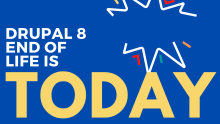It is hard to believe that almost 6 years passed since Drupal 8.0.0's release on November 19th 2015. What feels like it was just yesterday, Drupal 8 brought lots of amazing new things to the platform. Near and dear to my heart was full multilingual support that I worked on with over 1600 people for several years. Also stars of the Drupal 8 show were content authoring with the bundled CKEditor, the vastly improved configuration management system, Views in core, built-in web service support, more semantic markup, in-place editing, PHPUnit integration, better caching, improved accessibility, even aural announcements for page changes, and so on and on. Drupal 8 embraced collaboration within the PHP ecosystem and beyond with our use of Symfony, Twig, Guzzle and gradually embraced application of Composer.









